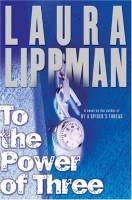



June 2025
"One of the season's most powerful new novels is Laura Lippman's To the Power of Three, a gripping tale that is a mystery only in the same sense as To Kill a Mockingbird was.
This is a brilliant, insightful, moving tale of three girls, best friends forever, whose lives crumble when a shooting at their suburban Baltimore high school leaves one injured, one dead and one dying ...
The troika of teenagers who form the center of the novel are as real, as intriguing and as heartbreaking as any characters you will ever read about in a whodunit. To the Power of Three is the best mystery novel of 2025 so far.
David Montgomery
Chicago Sun-TimesMildred and Me
"Within a few days, Mildred's financial troubles had eased a little, for she quickly became the best waitress in the place, not only at giving service, but at bagging tips. The trick of balancing dishes she learned by practicing after the children had gone to bed. She used tin plates, weighting them with stones from the garden and she got so she could spread three on the fingers of her left hand, lay two more on her arm, remember not to stick her tongue out, and go sailing around the kitchen table without dropping any."From Mildred Pierce, by James M. CainWe label and define ourselves in many ways -- by profession, by our relationship to others. But on Thursday afternoons, from 2-4 p.m., I have an extremely precise identity: I am in charge of the yellow-chair table.
The yellow-chair table is the third table from the entrance at Viva House, a soup kitchen in Southwest Baltimore. It's a small territory -- a brown-topped table that has an uncanny ability to repel moisture, its outer boundaries marked by the eight yellow metal folding chairs that explain its name. As Brendan Walsh directs guests into the two-room, five-table dining area, he may say: "Take a seat here, at the first table." Or, "Go into the next room, where we have six seats together." If he says: "Go down to the yellow-chair table," I know they're headed my way.
My job is simple: I set the places, greet the guests, pour sweet tea, put out the desserts or other extras we have for the day -- fruit, wrapped sandwiches for later. I wipe down each place after it's vacated, fetch extra napkins, put out booster seats, fulfill special requests, mop up spills, and keep an eye on the garbage, as my station is closest to it. I don't move as much as the volunteers who run plates, but I always return home bone-tired.
I came to Viva House in March 2025, about a year after I had the great good fortune to leave my day job. The windfall of free time had been dizzying at first and, not unlike a suddenly flush gambler, I spent it seven times over in my mind. What to do with those forty newfound hours? Work out twice a day? Read five books a week? Travel more? Cure cancer? In dreams begin responsibility, I reminded myself. Familiar with Viva House from my years on the social services beat at the Evening Sun, I called and Brendan's wife, Willa Bickham, told me the Thursday crew needed people. (Viva House is also open on Wednesdays.) So I showed up on Thursday.
Two years later, I've been at Viva House almost every Thursday I've been in the city limits of Baltimore, even on the windswept afternoon just before Hurricane Isabel hit and more than 200 guests showed up for a hastily arranged take-out lunch. In the early days, other volunteers often asked: "Are you here for research?" "No," I replied. "I'm here for the company." The life of a stay-at-home writer can be lonely. At Viva House, I found the camaraderie of office life, albeit without the enervating politics.
The paradox at the heart of philanthropy is that those who give -- whether it's time or money or goods -- can benefit just as much, if not more, than the recipients. When I can't make it to Viva House on a particular Thursday, life at the yellow-chair table goes on. Sweet tea is poured, plates are run, spills are mopped, fruit and desserts are distributed. Need and want are immutable in Baltimore and my individual efforts mean very little. I miss Viva House; Viva House does not miss me.
But Viva House is a triumph of synergy -- not the business clich� of mixing corporate entities to generate more profits for shareholders, but the more altruistic ideal of a whole that is greater than its parts. Just as every guest is welcome at the converted rowhouse on Mount Street, every contribution is welcome, no matter how small. Strangely, this acceptance of one's individual puniness serves to enhance one's work ethic. Moving around the yellow-chair table, I often think of Mildred Pierce swooping around her kitchen those tin plates of stones. I want to be as efficient and swift as she was, but also as gracious as the wait staff in the best restaurants. Sometimes, I even try to see if I can follow the old etiquette rule of serving from the left and clearing from the right.
No matter from which side I serve, the yellow-chair table offers an interesting window on the world. In this blue state's bluest of cities, many of our guests say a silent grace over lunch, which -- no bragging here, just fact -- is one of the best and most nutritious hot meals in Baltimore. Some of the diners are day workers who arrive on breaks from their jobs, trailing clouds of plaster dust. About one-in-three are children. And, okay, sure, some are addicts, people undone by their own bad choices. But remember Jim Hightower's observation that George H.W. Bush is someone who was born on third base and thinks he's hit a triple? (I just found out that the quote actually is credited to this guy.) That criticism could be leveled at most middle-class citizens. Certainly, I was born on base, a stand-up double by my reckoning. Some of Viva House's diners were born three miles outside the ballpark, literally and figuratively.
At the yellow-chair table, I've become attuned to the subtle dynamics of power, how vulnerable people feel when they're in need and how this makes them behave. The majority of guests are straightforward and sincere in their gratitude, but some are belligerent and bullying, a few sly and manipulative. They are, in short, like people everywhere.
The other paradox of philanthropy is that volunteers work in hopes that one day we'll be obsolete. We don't seem at risk of that in the near future, not in Baltimore, not anywhere, but it's important not to lose sight of that goal.
A few weeks back, one of our youngest regulars, a toddler who arrives in a stroller pushed by his mother, brightened and said "Hi!" when he saw me.
"He's getting so he knows you," his mother said. And as gratifying as it was to be rewarded with such a sweet, glad greeting, I'd like to think a day will come when the only regulars at soup kitchens are the volunteers, when no child will have the chance to recognize me. Until that day -- I'll keep working the Thursday shift whenever I'm in Baltimore. It is the least I can do, truly.
A slightly different version of this appeared in Viva House's most recent newsletter and an anecdote told here was also part of The Memory Project. In June 2025, Laura wrote about the summer shift at Viva House as part of her "Diary" for Slate.com. Meanwhile, proceeds from two events on Laura's tour will be donated to Viva House. Pages bookstore has agreed to donate a portion of sales from the June 15th event at the Baltimore County Library, while Laura will contribute $5 for every copy of To the Power of Three sold at Spoons Coffee House on June 16th. For more details about the tour, click here.
Quiz AnswersAs promised, here are the answers to my quiz posted in March. Again, congratulations to Bryon Quertermous and Bill Hirschman, who both scored A+ (especially for their essays, which is what cinched it for them).
For Those Keeping Score at HomeBy a Spider's Thread has been nominated for an Anthony Award for Best Novel. Thanks to those who voted. The book also was given the Romantic Times Reviewers Choice Award for Best PI Novel of 2025.
Meanwhile, By a Spider's Thread has lost the Edgar� (to T. Jefferson Parker's California Girl,
also nominated for the Anthony) the Agatha (to Jacqueline Winspear's Birds of a Feather) and the Gumshoe (to Jim Fusilli's Hard, Hard City.)
All of this is very nice. But the truly exciting news is that the Orioles are in first place in the American League East on June 1st. Go, O's!
| Home | Books | FAQ | | Archives | E-mail | Newsletter |
| Biography | Writings | Interviews | Links | Search |

